- Green and growing: Ricardo Maroni feeds oregano. Photo by Bill Rhodes
- Solution-oriented: Phyllis Sweeney adds nutrients to feed FRESH’s growing herbs.
- Keen to work: Bill Keen adds nutrients to basil plants. Photo courtesy of Liberty Corner Enterprises
- Pipe dream: Dr. Robert Sweeney, aka Dr. Bob, displays a PVC pipe bursting with herb seedlings.
I'm standing in an urban oasis. Under bright grow lights, Thai, Genovese and Italian sweet basil grow surprisingly big and almost impossibly green. The low trickle of the hydroponic system lightly gurgles, while strains of classical music infuse the room with tranquility. In one corner sits Dr. Robert A. Sweeney (he has a PhD in water resources) also known as Dr. Bob, tinkering on a computer. Nearby, his wife, Phyllis Sweeney, surveys tiny herb starts, just days from seed.
On the other side of the room, Bill Keen sits at a table, wetting the tip of a pencil in a glass of water. He dips it into a small pile of basil seeds, then places the seeds gently into holes in a sheet of rock wool. There they will sprout before being transferred to floating islands in the hydroponic "lakes," their roots dipping into nutrient-enhanced water. Keen's attention to detail is notable — the seeds must always be planted in groups of three, not two, not four — and he makes absolutely sure. Keen is friendly, chatty and meticulous. Keen also has an intellectual disability.
This urban hydroponic farm is Fresh, a project of Liberty Corner Enterprises. LCE is a nonprofit organization dedicated to helping people with disabilities reach goals that many of us take for granted — living, working and playing in regular homes, jobs and neighborhoods with minimal assisted living. This particular project of LCE carries the added benefit of producing beautiful, locally grown, organic culinary herbs, and is certified by the Appalachian Sustainable Agriculture Project as an urban farm.
Fresh is located in the LCE Center on Coxe Avenue, a jungle-warm room built into an otherwise rather unremarkable complex. LCE has provided supportive employment for people with varying disabilities for 25 years, Phyllis says. Some of the disabilities that clients have are physical (one man currently employed at Fresh is deaf). Others have intellectual disabilities and some have both. "[LCE has] been known over the years as the place that takes the hardest-to-place people, the people that can't find jobs in the community elsewhere because their disabilities hinder their ability to be successful in the general workplace," she says.
Seeds of change
Keen, one of Fresh's employees, is outgoing and barely able to contain his enthusiasm for the project. "It's excellent," he says. "I've been planting lots of seed flats, watering and wiring light fixtures and putting up fly tape. I've also been feeding the plants," he says excitedly. He talks about what plants need: water, air, light and nutrients. "Like us!"
Keen enjoys working with the herbs, feeding them, watching the seeds he plants grow tall and healthy. "I love it. I like doing it," he says. But, according to Keen, the electrical work he's learned to do with Fresh, the meticulous work of wiring the grow lights, is especially gratifying. "But I like everything about hydroponics," he says. "I like working with people, communicating, just my job in general and earning money."
The real value in his work seems to be in watching his contributions bear fruit. "It feels great. I have a great feeling in myself when I get to see these little tiny seeds become these big beautiful plants like these — see how beautiful they are?" he asks, gesturing toward the rows of verdant culinary herbs in various stages of growth. "This is like a jungle of plants we've got here."
This spring, Keen had to decide between a less active lifestyle, like heading to the mall or the movies with his caseworker, or attending a vocational rehab program like Fresh. His choice speaks volumes, says the director of operations for LCE, Jenny Reggi. "He only has so many hours of support of each week, and he's elected to use those hours for work."
And it’s satisfying work, Phyllis adds. "The whole purpose of [Fresh] was to have an in-house place to employ people with disabilities and make it worthwhile, not just have them sitting around shredding paper and putting stamps on envelopes," she says. "They're growing something they can see, something beautiful, nurturing. It's very exciting for them, and for us, to see them take ownership. It gives them such a great feeling of accomplishment and self-worth."
Feel-good food
Fresh's work with an under-served portion of the community has not gone unnoticed — nor has the quality of its product.
Representatives from Greenlife Grocery have taken interest in the herb company, says Dr. Bob. Fresh could soon become the primary herb supplier for the natural-foods grocery. The French Broad Food Co-op is already a client, as are a number of other local restaurants. "We're a small operation and we cannot supply herbs for the world," says Phyllis. "We're trying to get into area restaurants that value fresh, local and organic — and we have a few of those, don't we?"
Fresh, says Dr. Bob, offers an off-season choice for markets that want to provide local produce. "Right now, some of these markets are getting their products from Mexico, Columbia, Hawaii, Florida — it takes time to mosey those things over here."
What’s more, when dealing with foreign markets, there's the question of which pesticides are being used as well as potential contaminants. Fresh herbs, particularly basil, have been associated in the past with various food-borne illnesses and microbial contaminants like salmonella.
Hydroponic farming reduces harmful microbes that often thrive in soil. Without using soil as a growing medium, herbicides and traditional fertilizers aren’t necessary. And pest control at Fresh comes in the form of bright yellow sticky squares hung over the plants that trap the occasional flying insect. The small amount of space a hydroponic system requires (and the flexibility of location) is an agricultural benefit that urban farmers, often growing in rather nontraditional spaces, can really get behind.
Although Fresh uses all organic seeds and organic growing methods, as a hydroponic garden it can't be "officially" certified organic. "Unfortunately, there's no agency that will certify a hydroponic garden," says Dr. Bob. "But we can say — truthfully — that this is organically grown." The Appalachian Sustainable Agriculture Project has also certified Fresh as an Appalachian Grown farm.
Hop to it
Phyllis rubs her index finger and thumb over a leaf of bright green basil with serrated edges. It's Thai holy basil, she says, and it has medicinal properties. "For respiratory illnesses, for kidney stones and if you chew 12 leaves a day, it will solve your stress problems. Isn't that great?"
The duo is working to begin growing another plant known to relieve stress: hops. But conditions that are ideal for Genovese basil, for example, are not necessarily appropriate for the common beer-brewing ingredient.
"Hops grow very tall and they need a season of cold," says Phyllis. "As you can tell, we keep it pretty warm in here, between 75 and 79 [degrees]." However, the grow room’s location, within walking distance of three craft breweries (Green Man, Asheville Brewing Company and Craggie), makes accommodating the special needs of the bitter climbing plant an attractive prospect. With the assistance of various family members, the Sweeneys built a walk-in cooler out of oriented strand board and high-density insulation, equipped with a window air conditioner "fooled" into refrigerating the small room with the assistance of a CoolBot, an electric converter that programs household AC units to operate at lower temperatures.
Fresh will receive their first hop seedlings in March, which will be trellised to the walls as they grow (hops can reach a height of 25 to 30 feet in their first year). Several breweries have shown interest in the plants, says Dr. Bob. "Mrs. Oscar Wong wants us to culture hops so that Highland [Brewing Company] can put them outside of their tasting room for show and tell," he says. "But we'll also be working with them to supply their hops. We won't be able to supply all of their needs, but we'll provide some, and give the people engaged [in the program] some experience doing that."
That particularly benefits the Vocational Rehabilitation Services clients that Fresh employs, says Dr. Bob. "Some of the people in that program who are going to graduate and go into the regular industry, they could very well go into hop farming or something related," he says. "It's a good experience for them."
The Sweeneys are currently growing tabletop flowers for restaurants and are considering growing tomatoes as well, with some reservations. "We don't want to compete with local farms, so we're growing more or less specialized [items] that they don't produce," says Dr. Bob. "We will generate plants that are not available locally from the late fall to the springtime. During the growing season, we'll back off."
Further expansion of the program into different fields will offer more opportunities for the people employed by Fresh to interact with community, says Reggi. "Ultimately, they'll be a part of the entire process — not just the seeding but the delivery, too. Those community connections are what we're all about, and this project just exemplifies that. It's not just being here and growing, but also moving forward into the community."
— Mackensy Lunsford can be reached at food@mountainx.com.



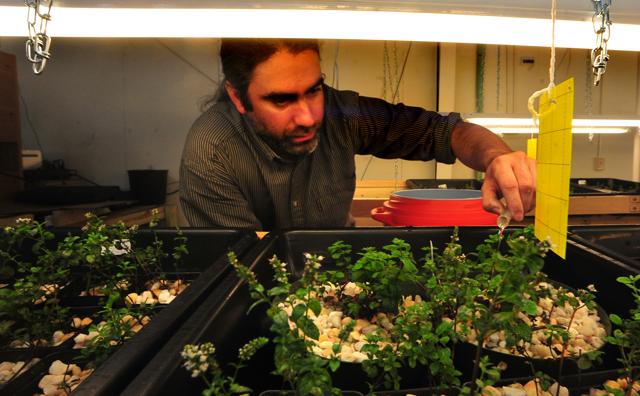
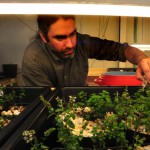
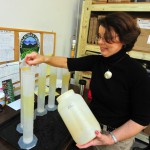
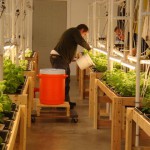
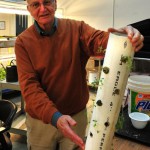
Before you comment
The comments section is here to provide a platform for civil dialogue on the issues we face together as a local community. Xpress is committed to offering this platform for all voices, but when the tone of the discussion gets nasty or strays off topic, we believe many people choose not to participate. Xpress editors are determined to moderate comments to ensure a constructive interchange is maintained. All comments judged not to be in keeping with the spirit of civil discourse will be removed and repeat violators will be banned. See here for our terms of service. Thank you for being part of this effort to promote respectful discussion.